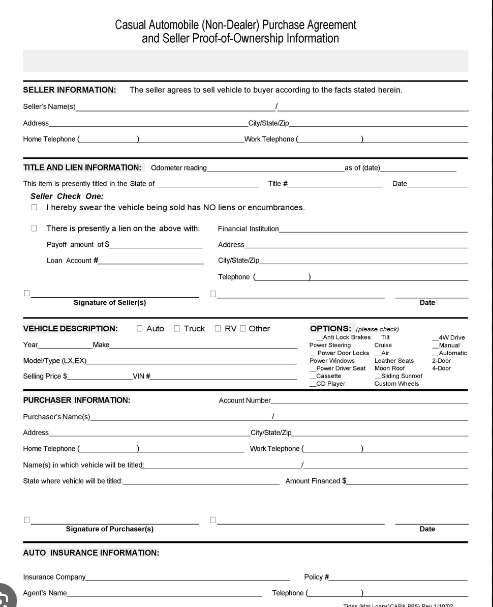Essential Documents for Buying a Car: Complete Guide

Buying a car is an exciting journey, but it also involves navigating through a plethora of paperwork. Understanding the essential documents required during the purchase process is crucial to ensure a smooth transaction. Whether you're purchasing from a dealership or through a private party, this guide will detail the documents you need, explain their importance, and provide you with the confidence to proceed with your car purchase effectively.
Understanding the Purchase Contract

At the heart of every car sale is the purchase contract. This document outlines:
- The terms of sale: Price, vehicle details, date of sale, and any special conditions.
- Payment structure: Whether you’re paying in full, financing, or through other means like lease-to-own.
- Disclosures: Information regarding the vehicle’s known defects or issues, often required by state laws.
📝 Note: Carefully read through the contract before signing. It’s beneficial to keep a copy for your records and consider having a lawyer review complex contracts.
Vehicle Ownership Documents

Here are the crucial documents related to vehicle ownership:
- Title: The most important document proving ownership. It shows who the legal owner is and lists any liens or encumbrances on the vehicle.
- Bill of Sale: Though not always legally required, it provides a record of the sale for tax and registration purposes, showing the purchase price and other sale specifics.
- Registration: While not a requirement at the time of purchase, you’ll need to transfer or obtain new registration post-purchase, which usually involves a fee.
Insurance Proof

Auto insurance is not just a legal requirement in most places; it’s also your safeguard against financial loss. You’ll need:
- Proof of Insurance: Before taking possession of your new car, make sure to have active insurance. This can be in the form of an insurance card or policy document.
🔔 Note: Some states might allow you a grace period to register your insurance, but don’t delay as driving without coverage can result in fines or even impoundment.
Loan and Financing Documents
If you’re financing your car purchase, expect:
- Loan Agreement: Details the loan amount, interest rate, repayment schedule, and any additional fees.
- Credit Report: Usually required by lenders to assess your creditworthiness.
| Document | Description |
|---|---|
| Loan Agreement | Your promise to repay the borrowed amount with interest. |
| Credit Report | Used by lenders to evaluate your credit history and determine your loan eligibility. |

Registration and Title Transfer

After the purchase, transferring ownership through registration is crucial:
- Title Transfer Application: Typically processed when you register the car in your name, often requiring an application form, fee, and possibly a trip to the DMV.
- Vehicle Registration: This formalizes your ownership for the state records, usually necessitating payment for registration fees and possibly personal property tax.
Vehicle History and Inspection Reports

While not required by law, these documents can influence your buying decision:
- Vehicle History Report: Services like CARFAX or AutoCheck can reveal past ownership, service records, accidents, or any title problems.
- Emissions Test Results: In states with mandatory emissions testing, results can indicate if the car meets environmental standards.
- Inspection Certificates: These might be needed for older cars or if you’re buying across state lines, ensuring the vehicle’s condition is up to par.
In this comprehensive guide, we’ve explored the essential documents you’ll need when buying a car, from the initial purchase contract to the final registration. Each document plays a vital role in ensuring a legal, smooth, and transparent transfer of ownership. The key points to remember include understanding the terms of your purchase agreement, securing proof of insurance before taking delivery, meticulously handling all ownership transfer processes, and considering the additional benefits of obtaining vehicle history reports for peace of mind.
Why do I need a bill of sale for my car purchase?

+
A bill of sale serves as a legal document that provides proof of the transaction. It lists the buyer, seller, vehicle details, and sale price, which can be critical for tax purposes, dispute resolution, or when selling or trading in the car in the future.
Can I buy a car without insurance?

+
Technically, you might be able to buy a car without insurance, but you won’t be able to drive it legally until you have insurance. Many states require proof of insurance before you can register your vehicle, and driving uninsured can lead to significant penalties.
What should I look for in a vehicle history report?

+
Look for any reported accidents, flood damage, odometer discrepancies, title issues, previous owners, service records, and any recalls or open service bulletins. This information helps you understand the vehicle’s condition and potential future maintenance needs.
Do I need an emissions test to buy a car?

+
It depends on your state’s regulations. Some states require an emissions test before selling a car, while others require it when you go to register the vehicle. Always check your local DMV or environmental agency for specific requirements.
How can I ensure the title transfer process goes smoothly?

+
Ensure all necessary paperwork is correctly filled out, verify the title is free of liens, pay the required fees, and adhere to your state’s DMV timeline for registration. Additionally, having the seller present when submitting the documents can help expedite the process.